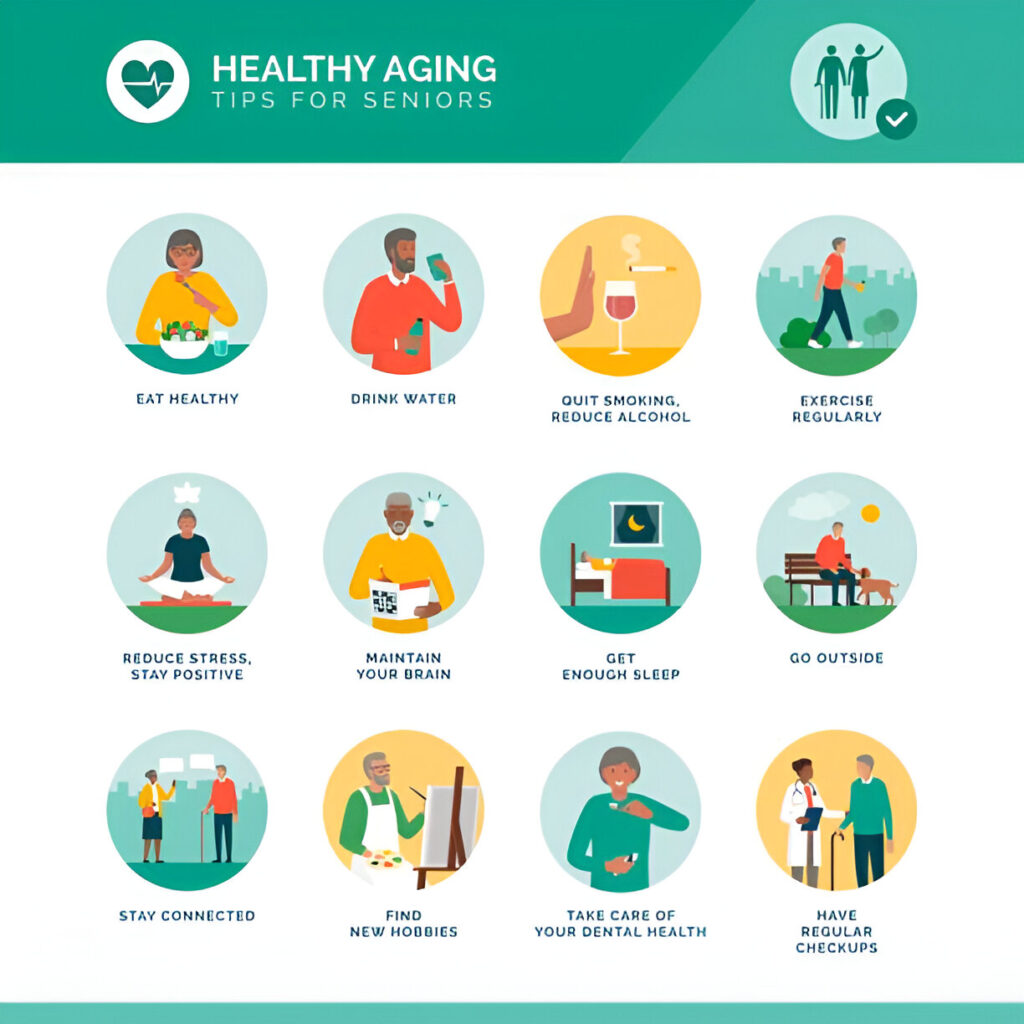Aging is inevitable, but how we age is largely within our control. Many people believe that getting older automatically means dealing with chronic diseases, but that doesn’t have to be the case. By making smart lifestyle choices, you can increase your chances of reaching 70 and beyond without chronic illnesses.
The Importance of Healthy Aging
Healthy aging means maintaining physical, mental, and emotional well-being as you grow older. It’s about staying active, eating right, and making choices that support longevity and vitality.
Understanding Chronic Diseases
What Are Chronic Diseases?
Chronic diseases are long-term health conditions that often develop due to poor lifestyle choices. These include diabetes, heart disease, high blood pressure, and arthritis.
Common Chronic Diseases in Aging
As people age, the risk of developing conditions such as cardiovascular disease, osteoporosis, and Alzheimer’s increases. However, these can often be prevented or managed through healthy lifestyle changes.
The Role of Genetics vs. Lifestyle in Aging
While genetics play a role in aging, lifestyle choices have a much greater impact. Studies show that a healthy diet, regular exercise, and stress management can significantly reduce the risk of chronic diseases, even for those with a genetic predisposition.
Nutrition for Longevity

Foods That Promote a Longer Life
- Leafy greens and colorful vegetables
- Nuts and seeds
- Healthy fats like olive oil and avocados
- Lean proteins such as fish and legumes
- Whole grains
Foods to Avoid
- Processed foods
- Sugary beverages
- Excess red meat
- Artificial trans fats
Exercise and Physical Activity
Benefits of Regular Exercise
- Improves cardiovascular health
- Maintains muscle mass
- Enhances flexibility and balance
- Reduces risk of chronic diseases
Best Workouts for Aging Adults
- Walking and jogging
- Strength training
- Yoga and tai chi
- Swimming
Mental Health and Cognitive Function
Importance of Mental Well-Being
Mental health is just as important as physical health. Staying socially active, engaging in hobbies, and practicing mindfulness can help maintain emotional balance.
Ways to Maintain Brain Health
- Reading and learning new skills
- Puzzles and memory games
- Staying socially engaged
- Meditation and relaxation techniques
Quality Sleep for a Healthy Life
Poor sleep can increase the risk of chronic diseases. Adults should aim for 7-9 hours of sleep per night to support brain function and overall well-being.
Managing Stress Effectively
Stress contributes to many chronic diseases. Managing stress through meditation, deep breathing, and spending time in nature can help improve longevity.
Avoiding Harmful Habits
Smoking and Alcohol Consumption
Smoking and excessive alcohol consumption are major risk factors for chronic diseases. Cutting down or quitting these habits can significantly improve health outcomes.
Regular Health Check-Ups and Screenings
Regular medical check-ups can help detect potential health issues early, allowing for better prevention and management.
Social Connections and Emotional Well-Being
Having strong social connections can reduce stress and boost longevity. Engaging with family, friends, and community groups fosters emotional well-being.
The Role of Hydration in Aging
Staying hydrated is essential for digestion, brain function, and energy levels. Aim to drink at least 8 glasses of water per day.
Holistic Approaches to Healthy Aging
Practices such as yoga, acupuncture, and herbal medicine can complement traditional health strategies and support overall well-being.
Aging healthily is a lifelong commitment, but it is achievable. By focusing on a nutrient-rich diet, regular exercise, mental well-being, and preventive healthcare, you can increase your chances of reaching 70 without chronic disease.
FAQs About Healthy Aging
1. Can I reverse the effects of aging?
While aging itself cannot be reversed, adopting healthy habits can slow down the aging process and reduce the risk of chronic diseases.
2. How important is exercise for aging well?
Exercise is crucial for maintaining mobility, strength, and cardiovascular health. It also boosts mood and cognitive function.
3. What is the best diet for longevity?
A diet rich in whole, plant-based foods, lean proteins, and healthy fats is best for longevity.
4. How can I keep my mind sharp as I age?
Staying mentally active, learning new things, and maintaining social connections help keep the brain sharp.
5. Is it too late to adopt a healthy lifestyle in my 60s?
No, it’s never too late! Making positive changes at any age can improve health and well-being.
